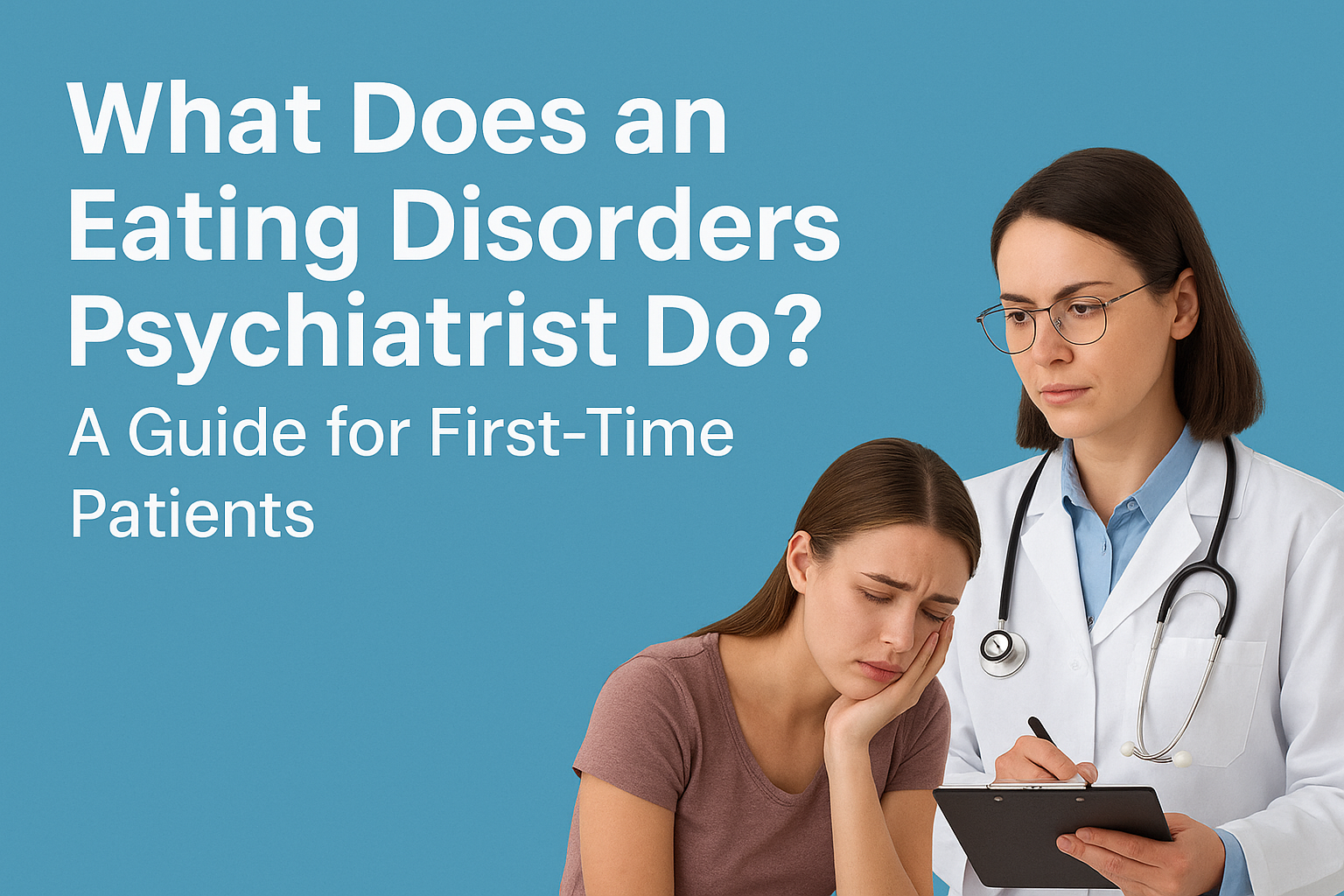When someone struggles with an eating disorder, it’s not just about food it’s about complex emotions, mental health, and physical well-being. Whether it’s anorexia, bulimia, or binge-eating disorder, recovery often requires professional help. One of the most crucial specialists in this process is an Eating Disorders Psychiatrist.
If you’re seeking treatment for the first time, understanding what this professional does and how they can help is an essential first step. This guide will walk you through their role, what to expect during your first visit, and how psychiatric care fits into long-term recovery.
Understanding Eating Disorders
Before exploring the role of an Eating Disorders Psychiatrist, it’s important to understand what eating disorders are.
Eating disorders are serious mental health conditions that involve unhealthy relationships with food, weight, and body image. They often stem from a combination of genetic, psychological, and environmental factors. Common types include:
- Anorexia Nervosa: Characterized by extreme food restriction and intense fear of gaining weight.
- Bulimia Nervosa: Involves cycles of binge eating followed by purging (vomiting, excessive exercise, or fasting).
- Binge-Eating Disorder (BED): Repeated episodes of consuming large amounts of food without purging behaviors.
- Avoidant/Restrictive Food Intake Disorder (ARFID): Avoidance of certain foods due to sensory issues or fear of choking, not body image concerns.
Each type affects both physical and mental health, making early diagnosis and treatment crucial.
What Is an Eating Disorders Psychiatrist?
An Eating Disorders Psychiatrist is a medical doctor (MD or DO) who specializes in diagnosing and treating eating disorders. Unlike psychologists or therapists, psychiatrists have the medical training to prescribe medications, monitor physical health, and address underlying psychiatric conditions such as anxiety, depression, or obsessive-compulsive disorder (OCD) that often coexist with eating disorders.
These specialists work closely with a multidisciplinary team, including therapists, nutritionists, and primary care physicians, to create a comprehensive treatment plan tailored to each patient’s unique needs.
The Role of an Eating Disorders Psychiatrist in Treatment
The psychiatrist’s job extends far beyond prescribing medications. They play a central role in evaluating, managing, and guiding the overall recovery process.
1. Assessment and Diagnosis
The first step is a comprehensive psychiatric assessment. During this evaluation, the psychiatrist reviews your medical history, eating habits, mental health background, and any previous treatments.
They may also:
- Order lab tests to assess the physical impact of the disorder (e.g., nutritional deficiencies, hormonal imbalances).
- Conduct psychological screenings for depression, anxiety, or trauma.
- Identify co-occurring mental health disorders, which are common among patients with eating disorders.
This thorough evaluation helps the psychiatrist develop a personalized treatment plan based on your specific condition and symptoms.
2. Medication Management
While not every patient with an eating disorder requires medication, psychiatrists can prescribe them when appropriate. The goal of medication is not to “fix” the eating disorder alone but to manage related symptoms such as mood instability, anxiety, or obsessive thoughts.
Commonly used medications include:
- Antidepressants (SSRIs): Help with depression, anxiety, and obsessive behaviors.
- Antipsychotics: Useful for addressing distorted thinking or severe anxiety.
- Mood stabilizers: Help regulate emotions and reduce impulsivity.
The psychiatrist monitors medication effects closely, adjusting dosages as needed and ensuring no adverse side effects occur.
3. Therapeutic Support and Counseling
Although psychiatrists often focus on the medical side of treatment, many also provide psychotherapeutic support. They may use approaches such as:
- Cognitive Behavioral Therapy (CBT): Helps patients challenge distorted beliefs about food and body image.
- Dialectical Behavior Therapy (DBT): Focuses on emotional regulation and distress tolerance.
- Motivational Interviewing (MI): Encourages patients to find their own motivation for recovery.
Psychiatric sessions often complement therapy with a psychologist or counselor, ensuring consistency and alignment in the treatment plan.
4. Monitoring Physical and Mental Health
Eating disorders can cause severe physical complications such as heart irregularities, bone density loss, electrolyte imbalances, and digestive issues.
An Eating Disorders Psychiatrist monitors these risks by:
- Collaborating with medical doctors and dietitians.
- Reviewing lab results regularly.
- Adjusting treatment strategies based on changes in physical health.
They also track mental health progress, ensuring that recovery is steady and relapse prevention strategies are in place.
What to Expect During Your First Appointment
If you’re seeing an Eating Disorders Psychiatrist for the first time, you may feel nervous or unsure of what to expect. Knowing the process can make it less intimidating.
- Initial Discussion: You’ll talk about your symptoms, eating patterns, and any emotional or physical challenges you’re experiencing.
- Medical Review: The psychiatrist may ask about your health history, current medications, and lifestyle habits.
- Diagnostic Evaluation: Psychological assessments or questionnaires may be used to identify your specific disorder and any co-occurring conditions.
- Treatment Plan: You’ll receive a personalized roadmap outlining therapy recommendations, potential medications, and follow-up appointments.
It’s important to be open and honest during this meeting. The more information you share, the better your psychiatrist can help.
When Should You See an Eating Disorders Psychiatrist?
Recognizing when to seek help can be difficult. However, early intervention can significantly improve outcomes. You should consider seeing a psychiatrist if you experience:
- Intense fear of gaining weight or obsessive calorie counting.
- Frequent binge eating or purging episodes.
- Emotional distress related to eating or body image.
- Rapid weight loss or noticeable changes in appetite.
- Feelings of guilt, shame, or depression connected to food.
Even if your symptoms seem mild, consulting an Eating Disorders Psychiatrist can prevent them from escalating into a severe condition.
How a Psychiatrist Fits into the Broader Treatment Team
Recovery from an eating disorder typically involves a multidisciplinary approach. A psychiatrist is one key part of a larger care team that might include:
- Therapist or Counselor: Provides ongoing emotional support and coping strategies.
- Dietitian: Develops a balanced meal plan and educates patients on healthy eating habits.
- Primary Care Physician: Monitors physical health and manages medical complications.
Together, this team ensures that every aspect of the disorder, mental, emotional, and physical is addressed.
The Importance of Early and Ongoing Treatment
Eating disorders are among the most life-threatening mental health conditions, but they are treatable. The sooner professional help is sought, the better the chances of full recovery.
An Eating Disorders Psychiatrist plays a vital role in early detection, stabilization, and long-term maintenance. They not only guide patients through the difficult process of recovery but also help them rebuild a healthier relationship with food and self-image.
Finding the Right Psychiatrist for You
When choosing a psychiatrist, consider the following:
- Experience: Look for someone who specializes in eating disorders.
- Approach: Make sure their treatment philosophy aligns with your comfort level and goals.
- Availability: Ongoing, consistent care is key to progress.
- Collaboration: The best psychiatrists work as part of a team with therapists and nutrition experts.
If you’re unsure where to start, platforms like Expertminds provide helpful insights and connections to mental health professionals experienced in treating eating disorders.
Final Thoughts
Seeking help for an eating disorder takes courage. Whether you’re just beginning your recovery or supporting someone you love, an Eating Disorders Psychiatrist can provide the medical and psychological expertise needed to heal both body and mind.
Through proper assessment, medication management, and emotional support, these specialists guide patients toward long-term recovery and healthier living. With professional care and a strong support network, recovery is absolutely possible.



Leave a Reply